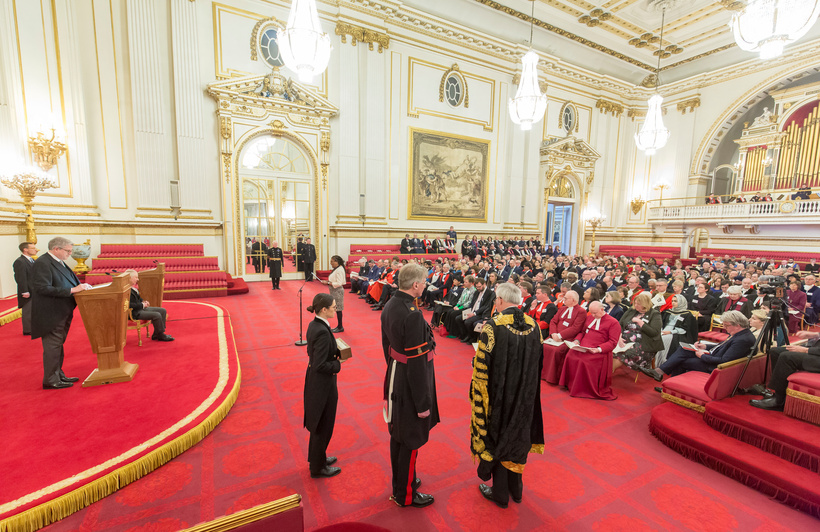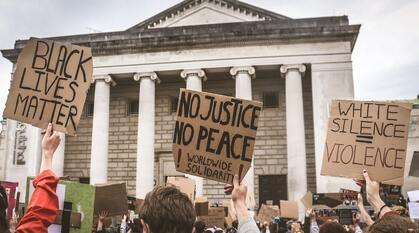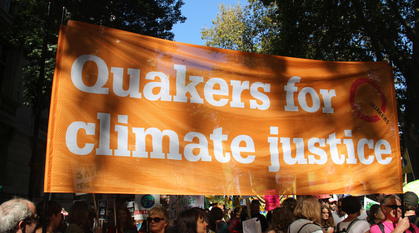A ‘privileged body’? Quakers and the history of loyal addresses
A Quaker delegation made a 'loyal address' to Charles III in March 2023. Lisa McQuillan explores the history of these addresses and examines the debate among Quakers about them.

On 9 March, a deputation of Quakers made an address to Charles III in the run up to his coronation. Quakers are granted the opportunity to do this as one of the UK's 'privileged bodies'.
The Society of Friends has used this privilege since the 17th century, and after the Act of Toleration in 1689, saw it as an important opportunity to demonstrate their loyalty to the government and the throne, and distance themselves from other more revolutionary and seditious religious sects. Indeed, in the 17th and 18th centuries several prominent Quakers were personally close to monarchs, for example in 1761, George III and family were hosted by Quaker banker David Barclay at his home in Cheapside, to watch the Lord Mayor's show.
Quakers today might be surprised at the ceremonial language used in the addresses, and outward display of deference, which continued right into the twentieth century. Quakers addressed monarchs on state occasions, to congratulate them on the birth of children, engagements and marriages, and although there was debate among Friends over the practice, tended to use formal titles when making the addresses.
Addresses in the modern era
Although Quakers have historically mentioned concerns of the day in the text of addresses, and on occasion had addressed the monarch outside of formal state occasions, they were rebuffed from doing so in 1983. Quakers sent a letter requesting an opportunity to address Elizabeth II directly on the topic of nuclear weapons, but were told:
“...that the Queen had taken note of the contents. However, since the matters raised were 'clearly ones for Her Majesty's Ministers' the Queen had instructed that the address should be forwarded to the Secretary of State for Defence. An audience with the Queen was not granted."
When the Recording Clerk pressed the Home Office for clarification, they were told that historically privileged bodies had been granted access to the monarch as many members of society were politically disenfranchised. As that was no longer the case (due to universal voting rights), they could only make an address on a state occasion. The point was also clearly made that these addresses should not touch on specific political issues over which a monarch should not have input.
Debate among Quakers
There had been some debate within the Society about making this address, with Roger Wilson claiming other avenues may not be viable as “for the first time in his recollection the country had a Prime Minister who was a 'non-listener'".
1849 was the last time a direct address on a 'political' topic, outside of a state occasion, was granted. Quakers met with Victoria to present a concern on the abolition of slavery. They wanted the monarch to use her influence over rulers of other countries around the world that had not yet banned enslavement or trafficking of people.
Although in 1983 there had been some internal debate around whether to approach the monarch over nuclear weapons, this debate was more about the effectiveness of using the address as a campaigning strategy rather than any anti-royal or republican sentiment. The incident was reported in The Friend, the independent Quaker magazine, but didn't excite the letters page.
Changes in the 21st century
The same cannot be said for the last address during the Diamond Jubilee in 2012, which focused on peace, the climate crisis and the Quaker commitment to equality in marriage. Letters in The Friend in the lead-up to the address, and for a few weeks after, expressed a variety of Quaker views. Several expressed a disbelief that the Society did not view the institution of the monarchy as in direct contradiction to the testimony to equality, while others defended the record of Elizabeth II, and did not see support for monarchy as contrary to Quaker values.
In 2023 there was a short timetable for accepting the invitation. In the absence of further discernment since 2012 on whether to address the monarch, Quakers decided to use the occasion to reflect recent Quaker discernment on peace, the climate crisis, trans inclusion and reparations for the transatlantic slave trade.
These days Quakers don't claim personal friendships with the monarch and there is much less deference on display. The delegation was made up of representatives of national Quaker bodies. Young Friends General Meeting was invited but declined to take part, responding “that participating legitimises an institution at odds with Quaker values, that making a 'loyal' address would not be truthful, and that our presence would be tokenistic rather than following the movement of the Spirit".
No doubt there will continue to be debate among Quakers about participation in loyal addresses.


